Current HIV Research ( IF 1 ) Pub Date : 2021-08-31 , DOI: 10.2174/1570162x19666210607115010 Mohammed A Abdullahi 1 , Zubairu Iliyasu 1 , Aishatu L Adamu 1 , Isa S Abubakar 1 , Hamisu M Salihu 2 , Muktar H Aliyu 3

|
Background: Despite the global decline in pediatric HIV infections, infants in sub-Saharan Africa still acquire HIV infection through inappropriate feeding.
Objective: The objective of the study was to compare knowledge and predictors of infant feeding behavior between mothers living with HIV and controls of unknown HIV status in Gombe, northeast Nigeria.
Methods: A cross-section of clinic-based samples of 84 HIV-positive mothers and 170 controls of unknown status were interviewed using validated questionnaires. Knowledge scores and self-reported infant feeding practices were analyzed. Multivariate logistic regression models were employed to determine predictors for infant feeding practices.
Results: Transmission risk perception (95.2% vs. 65.3%) (p<0.05) and adequate knowledge of infant feeding (77.4% vs. 51.2%) (p<0.05) were higher among HIV-positive mothers than controls. Compared with mothers of unknown status (56.5%), a higher proportion of HIV-positive mothers (84.5%) reported breastfeeding the index infant exclusively for 6 months (p<0.05). In contrast, mixed feeding was more prevalent among controls (19.4% vs. 4.8%) (p<0.05). Further, over a third (39.3%) of HIV-positive mothers and 27.6% of controls weaned their infants at ≥12 months (p>0.05). Antenatal attendance, hospital delivery, knowledge, and positive attitude predicted infant feeding practices in both groups. The predictive roles of education and parity were limited to HIVpositive mothers, while the effects of maternal age and infant death were restricted to controls.
Conclusion: Risk perception, knowledge, and exclusive breastfeeding rates were higher among mothers living with HIV. Antenatal care, hospital delivery, knowledge, and attitude predicted infant feeding practices in both groups. Girl child education, antenatal care, hospital delivery, and sustained promotion of exclusive breastfeeding with antiretroviral therapy are key to HIV-free infant survival.
中文翻译:

尼日利亚东北部 HIV 阳性母亲和对照组婴儿喂养实践的相关性
背景:尽管全球儿童 HIV 感染率有所下降,但撒哈拉以南非洲的婴儿仍然通过不适当的喂养而感染 HIV。
目的:本研究的目的是比较尼日利亚东北部贡贝地区感染 HIV 的母亲与未感染 HIV 状态的对照组对婴儿喂养行为的了解和预测因素。
方法:使用经过验证的问卷调查了 84 名 HIV 阳性母亲和 170 名状态未知的对照的临床样本的横截面。分析了知识分数和自我报告的婴儿喂养实践。采用多变量逻辑回归模型来确定婴儿喂养实践的预测因素。
结果:HIV 阳性母亲的传播风险认知(95.2% 对 65.3%)(p<0.05)和对婴儿喂养的充分了解(77.4% 对 51.2%)(p<0.05)高于对照组。与身份不明的母亲 (56.5%) 相比,更高比例的 HIV 阳性母亲 (84.5%) 报告仅母乳喂养指数婴儿 6 个月 (p<0.05)。相比之下,混合喂养在对照组中更为普遍(19.4% vs. 4.8%)(p<0.05)。此外,超过三分之一 (39.3%) 的 HIV 阳性母亲和 27.6% 的对照组在≥12 个月时断奶(p>0.05)。产前出勤、住院分娩、知识和积极态度预测了两组婴儿的喂养习惯。教育和生育的预测作用仅限于 HIV 阳性母亲,
结论:感染 HIV 的母亲的风险认知、知识和纯母乳喂养率较高。产前保健、住院分娩、知识和态度预测了两组婴儿的喂养习惯。女童教育、产前护理、住院分娩和持续促进纯母乳喂养和抗逆转录病毒疗法是无艾滋病毒婴儿存活的关键。


























 京公网安备 11010802027423号
京公网安备 11010802027423号